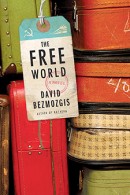 In the New York Observer, Irina Aleksander writes: “The cruel joke of immigration is that to reach the freedoms promised by the Western world’s relative economic and political stability, the immigrant must, for a period of transition, forfeit certain liberties to which he has grown accustomed. An educated, active member of his past social order, he suddenly finds himself disabled, unable to speak freely or understand when spoken to.”
In the New York Observer, Irina Aleksander writes: “The cruel joke of immigration is that to reach the freedoms promised by the Western world’s relative economic and political stability, the immigrant must, for a period of transition, forfeit certain liberties to which he has grown accustomed. An educated, active member of his past social order, he suddenly finds himself disabled, unable to speak freely or understand when spoken to.”
David Bezmozgis’ first novel (after a lovely collection of stories, Natasha, in 2004) focuses on a Jewish family from Latvia, the Krasnanskys. It’s 1978, and the family is in the way station of Rome for six months, awaiting their visas and word on where they will resettle. Jeet Heer says, “Like the earlier heroes of Kafka or Bellow, they are caught in bureaucratic limbo, and uncertain of their future.” Kafka and Bellow are only two of the heavyweights to whom Bezmozgis has been compared. Others include Philip Roth and Isaac Babel.
Bezmozgis and his family moved to Canada from Riga when he was six, and The Free World has been praised for, among other things, the authenticity of its immigrant-English dialogue. Adam Langer says, “He has created an unflinchingly honest, evenhanded and multilayered retelling of the Jewish immigrant story that steadfastly refuses to sentimentalize or malign the Old World or the New.”
Samuil, the family’s patriarch and an unyielding Communist, is contrasted with his children, including his anti-Soviet sons Karl and Alec, who essentially force their father to leave the country. Adam Kirsch writes, “In a world that has experienced the failure of Communism, Samuil is a melancholy spokesman for the old generation of Eastern European Jews who believed passionately that the Revolution would redeem them. More and more, his memories and reflections dominate the novel.”
Heer feels there is ultimately “something calculated and cold” about Bezmozgis’ style, that “like an old-fashioned documentary filmmaker, [he is] eager to record the movements of his characters but careful not to become involved in their lives.” Kirsch says, “The Free World is a very different book from Natasha, for both good and ill. In moving from the short story to the novel, Bezmozgis has become a more deliberate and objective writer; he has also become a more cautious and dutiful one.”
The most disappointed critique comes in a close reading by Aaron Thier, who writes: “Everything that happens in Natasha feels like a significant moment. To put it another way, there are no insignificant moments. There is nothing that Bezmozgis might as well have left out. This is strange, even incomprehensible, given that the critical failure of [The Free World] is that it makes no distinction between significant and insignificant moments. It’s as dull as Natasha is sharp; baggy where its predecessor is tight as a drum; stuffed to bursting with things that he should have left out. How could this have happened, and why?”
On balance, reviewers have overlooked whatever flaws they found. Heer ends by calling Bezmozgis “unquestionably one of the star writers of his generation,” and other critics, who acknowledge that the pacing of the novel is uneven, say he makes up for that with an acute eye and his gift of style.
In the Guardian, Colin Greenland writes, “The Free World may not have much of a plot, but it is heavy with the consciousness of time, the inevitability of crises. Bezmozgis has the knack of ending scenes, chapters, especially, at the perfect reverberant moment, plangent or ironic.” (This reminds me of the last few lines of the story “Natasha,” one of my favorite endings.)
In the end, it’s the capture of the immigrant experience that has most impressed reviewers. Liesl Schillinger writes, “His characters may seem to be selfish, but they have knowingly jeopardized their own happiness to secure the happiness of those who will come after, and to justify the sacrifices of those who came before.”
The Free World by David Bezmozgis
Farrar, Straus and Giroux, 368 pp., $26.00

